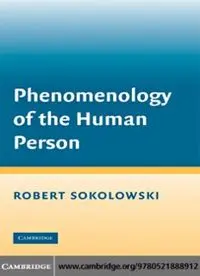
Phenomenology of the Human Person PDF
Preview Phenomenology of the Human Person
This page intentionally left blank Phenomenology of the Human Person In this book, Robert Sokolowski argues that being a person means being involved with truth. He shows that human reason is established by syntactic composition in language, pictures, and actions and that we understand things when they are presented to us through syntax. Sokolowski highlights the role of the spoken word in human reason and examines the bodily and neurological basis for human experience. Drawing on Husserl and Aristotle, as well as Aquinas and Henry James, Sokolowski employs phenomenology in a highly original way in order to clarify what we are as human agents. Robert Sokolowski is the Elizabeth Breckenridge Caldwell Professor of Philosophy at The Catholic University of America. Twice awarded research fellowships from the National Endowment for the Humanities, he has also served as a consultant at the Los Alamos National Laboratory and gave the twenty-sixth J. Robert Oppenheimer Lecture there in 1996. He has also served as visiting professor at the Graduate Faculty of the New School University, the University of Texas at Austin, Villanova, and Yale University. Dr. Sokolowski is the author of many books, including Introduction to Phenomenology, Moral Action, The God of Faith and Reason, Presence and Absence, and Husserlian Meditations. Phenomenology of the Human Person ROBERT SOKOLOWSKI The Catholic University of America CAMBRIDGE UNIVERSITY PRESS Cambridge, New York, Melbourne, Madrid, Cape Town, Singapore, São Paulo Cambridge University Press The Edinburgh Building, Cambridge CB2 8RU, UK Published in the United States of America by Cambridge University Press, New York www.cambridge.org Information on this title: www.cambridge.org/9780521888912 © Robert Sokolowski 2008 This publication is in copyright. Subject to statutory exception and to the provision of relevant collective licensing agreements, no reproduction of any part may take place without the written permission of Cambridge University Press. First published in print format 2008 ISBN-13 978-0-511-39730-1 eBook (NetLibrary) ISBN-13 978-0-521-88891-2 hardback ISBN-13 978-0-521-71766-3 paperback Cambridge University Press has no responsibility for the persistence or accuracy of urls for external or third-party internet websites referred to in this publication, and does not guarantee that any content on such websites is, or will remain, accurate or appropriate. To Kevin White with thanks for philosophical conversations Philosophy thrives on confusion. – John N. Findlay Viam veritatis elegi. – Psalm 119 Contents Acknowledgments page ix 1 Introduction 1 P ART I : THE FORM OF T HI NKING 5 1 Two Ways of Saying ‘I’ 7 2 Further Kinds of Declaratives 2 3 Linguistic Syntax and Human Reason 31 4 The Person as the Agent of Syntax: Predication 48 5 Reason as Public: Quotation 68 6 Grammatical Signals and Veracity 80 P ART I I : THE C ONTE NT OF THI NKIN G 97 7 The Content of What Is Said: Essentials and Acidentals 9 8 Properties and Accidents Reveal What Things Are 117 9 Knowing Things in Their Absence: Pictures, Imagination, and Words 136 10 Mental Representations 157 11 What Is a Concept and How Do We Focus on It? 177 P ART I I I : THE BODY AND HUMAN ACTION 19 1 12 The Body and the Brain 193 13 Active Perception and Declaratives 205 14 Mental Images and Lenses 225 vii viii Contents 15 Forms of Wishing 238 16 Declaring Our Wishes and Choices 253 PA RT IV : ANCIE NTS AND MOD ERN S 271 17 Aristotle 273 18 Thomas Aquinas 286 19 Conclusion, with Henry James 304 Bibliography 325 Index 3
